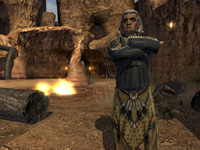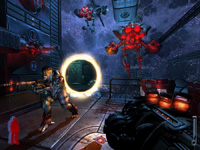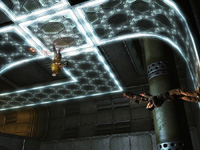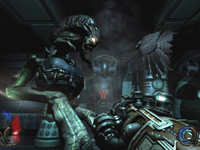Prey Review 277
- Title: Prey
- Publisher: 2K Games
- Developer: Human Head Studios
- System: PC (360)
Instead of the protagonist's racial background being a footnote, or something you only find in the manual, Human Head brings a version of Native American spirituality to the fore by tying it directly into gameplay elements. Tough-guy Tommy doesn't believe in 'that crap' when the game starts, but soon enough he's leaving his body to walk about as a being of pure spirit (which comes in mighty handy around auto-turrets). This 'out of body' experience means that, for all intents and purposes, Tommy can't die. When you do deplete your health bar, instead of reloading the game you're taken to a grim-looking plateau and given the chance to fight for your life. Your spirit-bow is quite adept at taking out the bad spirits surrounding the place, and every one you destroy returns a little health or spirit energy. After a set time span, you're sucked back down and out into the living world to face your foes again. It was great not having to worry about saving and reloading, but after the third or fourth time the simple shoot-the-spirits game got a little old. It would have been great if the spirit world had become a tougher place further into the game. And while the occasional chat with your dead grandfather was enjoyable from a plot perspective, the lack of gameyness to your trips into ancient New Mexico disappointed. The designers took us on an in-game spiritual journey, but there was very little to actually 'do' as that journey progressed.
While there are spirits in the game, most of the shiny comes from alien technology. Portals are a great tweak to time and space, and already look like they're going to be a permanent fixture in FPS gaming. Opponents and some simple switches can throw open oval passageways to 'someplace else'. Not just a loading gimmick or gag, the portals physically link areas that are otherwise inaccessible. Early in the game they do a bit of showing off by walking you past a glass box with a small rock in it. You're left wondering what exactly it is, as it has no obvious purpose. Just a few moments later, though, you're stepping through a portal onto a rocky spheroid inside a glassy enclosure. It's a cheap trick, but effective at getting across the technology's potential. The gravity flipping trick is a more straightforward puzzle element, requiring you to alternate the orientation of 'down' in order to gain access to various surfaces in a room. In most cases it's fairly simple to see what's going on, but there are several great Escher-esque moments that require you to exercise your three dimensional thinking skills. The 'undying protagonist', gravity-flipping, and already adopted-portals are all great gimmicks, and I find myself actually hoping that I'll be seeing copycat game mechanics in future FPS titles.Unfortunately, the overall vision of the game falls somewhat short of the greatness it was striving for. The techno-organic (read: drawn on a trapper-keeper) motif that your surroundings and enemies display begins to look exactly like every other game made with the Doom 3 engine after you've killed your tenth identical bad guy. So far, every game we've seen made with this technology have been visually arresting, but more or less artistically bankrupt. Prey, at least, takes the gooey look to its fullest; many of your weapons are actually alive, and some were formerly pieces of enemies. As you're walking along, your weapon might hiss at you menacingly. This little touch is so clever and appreciated that it makes the boring sameness of the enemies and corridors that much more drab.
Even more frustrating is the ease with which most veteran FPS players will complete this title on 'Regular' mode. There's a solid fifteen hours or so of gameplay here, but for the first half of the game you're probably going to find yourself trying to remember what the spirit world looks like. The second half is more challenging, but only at a level the first half should have ramped up to. That said, I would far and away rather games be too easy than too hard; it's a lot of fun to finish a game and I think a lot of modern titles don't keep that in mind when gauging difficulty. The challenge level felt as though they were purposefully teaching you as you went; the integration of new elements into your knowledge of the game world was accomplished at a brisk but digestible pace. Just the same, once the game really got rocking I found myself hoping for more intelligent baddies to fight; not every bad guy can be from F.E.A.R., I guess.Visually, Prey acquits itself well against its contemporaries. The Doom 3 engine is still a solid platform to wrap a game around, and the dark-n-moody atmosphere it fosters was fairly appropriate considering the setting. The 'generic alien squishiness' did get old after a while, though. Even more annoyingly, the alien designs felt uninspired on first brush and just kept hanging around throughout the game. There just aren't that many types of baddies to face in this title. While I'm not looking for a menagerie to start hunting me down, I would have liked a little more variety; the ground-level grunt was particularly boring. The spiritual children, at least, were interesting from a background standpoint. Encountered in a few choice areas, their creepy appearance and haunting laughter was one of the few genuine chill-inducing elements of the game. Aurally, there wasn't much beyond those laughing children to look forward to. Forgettable music and fairly standard moans and groans from your enemies dog your steps through the game. Weapons sounds were serviceable; while not anything amazing, they did lend a passable feeling of weight and power to your arsenal. My favorite audio element was actually the occasionally overheard snippets of radio broadcasts from Earth. Quiet moments could be spent preparing for your next run by listening to (real-life radio host) Art Bell receive calls from bewildered humans experiencing the alien invasion on the ground. The only real humour in the game, the vignettes were well written and produced, and well worth the time it took to listen.
Prey, with its retro-inspired corridor shooting and tired alien antagonists, could have fallen victim to retread gameplay and genre boredom. Instead, Human Head has managed to lift the simple shooter out of mundanity by give us some new things to see and do while we're mowing down generic baddies. A serviceable plot and a spiritual twist, on top of new-tech portals and gravity flipping, is just enough to make everything old seem somehow a little bit new. The 'classic' shooter is something I'm starting to get tired of, but with Prey at least one more title has made aiming and shooting fun enough to recommend. If you're a fan of the FPS genre, especially the early work of id software, you're going to have fun with the new toys given to us by Human Head Studios.



Too Much Serious Violence (Score:5, Insightful)
All new 3D Shooters are missing one thing... (Score:5, Insightful)
What ever happened to Co-op mode? That available back in the days of Quake and DN3 and was hugely popular. It was fun battling the computer with a buddy. Then for some reason it just vanished from most titles. I say bring back co-op mode and breathe a little life back in this tired genre.
http://religiousfreaks.com/ [religiousfreaks.com]Doom III Engine Doom II the Game (Score:5, Insightful)
Much better than Doom 3, [...]
Off course. Carmacks' strength lies in designing game engines and renderers, not games. Most of ID's profits are made up of licencing engine technology to companies that know how to make games rather than the engines.
Re:All new 3D Shooters are missing one thing... (Score:5, Insightful)
That said, even in the Doom days there were plenty of levels that would break if one player did something when the others were in the wrong area, such as sealing off the starting area so that when you died you faced a brick wall rather than empty corridors.
As things became ever more complicated it seemed to become harder and harder for the developers to ensure that there were no catch-22 type setups and after Hexen II and (IIRC) Quake II it pretty much seemed to vanish from games, Serious Sam excepted.
What's the copy protection like? (Score:5, Insightful)
I kinda wish game reviewers would start including this information in the review. It sounds like a neat game, but I have one very simple requirement before I'll buy another PC game:
It must run without the CD in the drive.
I wish reviewers would include information on how the copy protection is on these games. If I had known that WarCraft III would find a way to kill my CD drivers, I'd never have bought it. (Seriously, I had to reinstall Windows to regain access to my CD drives.) I'm sick of putting up with video games that require the CD for no good reason, and am simply furious at the games that attempt to install driver-level code.
Can Slashdot reviews please start containing information on how the game handles copy protection? I'm willing to put up with registration keys and online activation. I'm not willing to put up with having to have the CD in the drive just to run the game.
Prey sounds like it's a game I might be interested in playing - assuming that the copy protection isn't too severe.
Re:too hard is bad? (Score:5, Insightful)
Does it use STARFORCE? I'm not buying/playing it. (Score:3, Insightful)
Where are the innovations ? (Score:3, Insightful)
Since then I have found very little in online gaming that could possibly compare with that experience. Since then clone after clone of the original quake game with no innovations other than a little tweak of the graphics here and there has been released. Team fortress was probably the first and last (very obvious) true innovation for this genre. Every title that has been released since then has really only done one thing and that is splinter the online gaming community into smaller and smaller inconsequential parties, the differences between each party only being measured by the bank accounts of the distributors of these overly rehashed games.
There has been far too much emphasis on single player gameplay, I find playing single player is a little like getting out the playboy magazines and locking yourself in your room in favour of meeting up with your girlfriend and then there's the same leap in excitement going from adhoc multiplayer games to organised team play (ie where each game you're representing a team with the same team mates).
Whats more exciting throwing a football about in the park with a random selection of friends ? Or playing in a team in a large competion ? Anyone who has done both will tell you the thrill of playing with serious intent in an organised competition is far more exciting.
Personally I really don't care about graphics or whether I'm a genetically modified army doink, or an indian. Once you're immersed in a real competition such subtlties are really of no consequence, it's a bit like the quality of the turf at a football field, it really doesn't impact on the intensity of the game play.
What it comes down to is basically people in the industry know there's no need to really create anything new, they can just schlopp up the same old swill into the trough year after year and people will keep buying it. It's a cheap and easy buck and a shore fire way to make money, but it totally lacks vision.
Re:too hard is bad? (Score:3, Insightful)
Halo for PC. I played it through on normal (or was it easy?) difficulty. Awesome game, excellent story. As I played, I got better, and decided to play it again on Legendary.
Wow. Big difference; lots and LOTS of reloads. It became more a game of "survive this checkpoint and reload till you get the next". I eventually got to the point where it was TOO HARD. I could NOT beat the initial fight on the Truth and Reconciliation ship (after taking the elevator up from the landing zone).
I lost count of the reloads. A large portion was luck (which doors were opened first? could I get an initial sticky grenade on the first guy? Were my teammates a bunch of retards?), but the fact is, I was unable to progress past that point in the game at that level of difficulty. In this case, harder was not completely "better". If that had been the only difficulty level, that would have been poor game design.
I don't mind 30 hours of game play. I do object when 5-10 hours are spent on the same checkpoint with no progress. (I might have reattempted it, but after patching the game, my savegames got toasted and I did not feel like slogging through that level again. *shrugs*.
Had I co-op mode available, this might have been more do-able. As is
Re:too hard is bad? (Score:5, Insightful)
I trust you're a big fan of NetHack, because by that standard it is possibly the perfect game. *
Harder is not in and of itself better. As Zonk notes it's not that easy is better than hard, it's that too easy is better than too hard. "Too hard" means "I have no hope of finishing it," or maybe "I've got better things to do than replaying the same 5 minutes of game for the next month until I'm good enough to move on." That's not fun, it's just frustrating. At least with the too easy option I can see the story play out and look at the pretty graphics if I'm into it. Depending on the game, I may be able to add my own limitations that make the game harder ("No grabbing health packs," "Only use the pistol," "No building tanks.") If the game is too hard, I'm just done.
Of course, ideally the game is Just Right, hard enough that I feel challenged, but easy enough that I beat it before I get pissed off and give up. Of course how difficut that is varies from person to person, making it a tough balancing act.
(* NetHack is a brilliant game, but is because of the depth of gameplay, not because it's so brutal that it's self selected to a very small community.)
Re:Just A Variation On A Theme (Score:3, Insightful)
FPS was revolutionary when it first came out (Wolfenstein 3D, Ken's Labrynth, etc.), and it's definitely mature now. What it takes to make it engrossing is a strong sense of what's being aimed for. Half Life had a strong story (heck, you don't play for the first 2 or 3 levels, you just walk through the events), Serious Sam is an unapologetic shoot-em-up. Doom 3 was pretty much "look at our new engine!", so it got great reviews on its look, but poor ones on gameplay (outside of the tension).
Half Life does SO well because it combines the "Wow!" factor of engine upgrades with an engrossing plot. But a plot isn't necessary for fun, as long as you're honest about what it is. It's the halfway efforts that fall flat. All the new tricks in the world can only attract people, they won't stick around if they don't enjoy it.